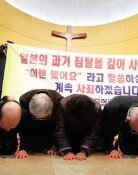[Editorial] Surviving the Global Financial `Hurricane`
[Editorial] Surviving the Global Financial `Hurricane`
Posted September. 17, 2008 07:52,
The fallout from the Wall Street crisis is serious enough to turn the global market upside down. World markets have literally fallen into a panic as the fourth-largest U.S. investment bank Lehman Brothers filed for bankruptcy and the world`s largest securities firm Merrill Lynch was bought by Bank of America. The debacle has caused stock markets to collapse in the United States and Europe, and the aftermath dealt a serious blow to Asian stock markets yesterday.
As Koreas benchmark stock index KOSPI fell a whopping 90.17 points, Korea was hit by a "black Tuesday." The won fell 50.90 points against the greenback, the biggest daily drop in ten years, aggravating financial uncertainty. The U.S. financial meltdown is giving a hard time to the Korean economy, which has struggled to silence rumors of a financial crisis this month.
Unlike optimistic expectations, the specter of the U.S. subprime mortgage crisis, which has continued to rattle the global financial market, is highly likely to linger over the long term. The U.S. model of investment banking focusing on short-term profit has turned out to helplessly collapse when external shocks are applied. Before the U.S. housing market stabilizes, no one knows how much losses the financial sector will suffer and whom the next victims of the subprime mortgage crisis will be.
U.S. financial uncertainty is expected to do more than spread gloom to global financial markets. The subprime mortgage crisis will contract the U.S. economy and bring about a global economic slowdown.
The direct losses suffered by Korean financial institutions are smaller than expected considering the investment amount. Koreas financial institutions stand to lose 720 million U.S. dollars due to Lehman`s bankruptcy. Taking their asset quality into consideration, they can tolerate this loss. Worryingly, however, Koreas financial indicators have gotten worse than their counterparts in the United States and other advanced nations. In Korea, investors are too sensitive to external shocks and thus invite more damage to their financial assets.
Under the principle of relief loans to companies means creating a moral hazard with public taxes, the U.S. government has rejected bailing out Lehman Brothers. That means the U.S. financial system has fundamentals strong enough to absorb the shock of the failures of Lehman Brothers and Merrill Lynch. Many governments have come up with all possible solutions and made a concerted effort to prevent the crisis from spreading further. China cut its key interest rate and reserve requirement ratio, and Japan injected 1.5 trillion yen into its short-term financial market.
Korean authorities say the crisis might sap investor confidence over the short term, but will reduce financial uncertainty and ease the credit crunch over the mid- and long-term. No nation is free from the Wall Street debacle, but investors should not respond in an extremely sensitive way. At the same time, Korea should not lower its guard, as the country is set to return to net debtor status as net external credit, the difference between its external credit and external debt, was 2.7 billion U.S. dollars at the end of June.
Fortunately, the state-owned Korea Development Bank withdrew its proposal to acquire Lehman Brothers. Still, it should be examined whether the bank dropped its acquisition attempt based on accurate information and thorough analysis.
Financial authorities such as the Strategy and Finance Ministry, the Financial Services Commission, the Bank of Korea and presidential secretariat for economic policy are busy discussing the root causes and aftermath of the crisis. Leading financial institutions have failed to urge the global economy to establish a new financial order, and have instead pushed to change certain regulations. Korea should strengthen its oversight for unexpected risk factors in the global financial market to provide a steady supply of foreign currencies and restore investor confidence by encouraging close cooperation among government agencies and implementing effective countermeasures.
Do Strategy and Finance Minister Kang Man-soo, Financial Services Commission Chairman Jun Kwang-woo and senior presidential secretary for economic policy Bahk Byung-won have the correct insight into this crisis? Even when a crisis emerges, policymakers can prevent the market from collapsing if they make timely and correct decisions and deal with looming problems swiftly.







